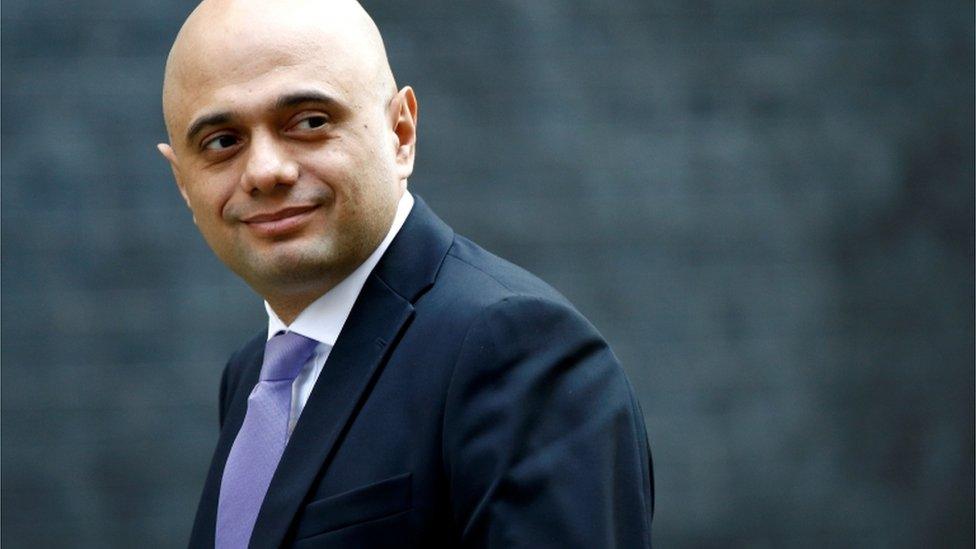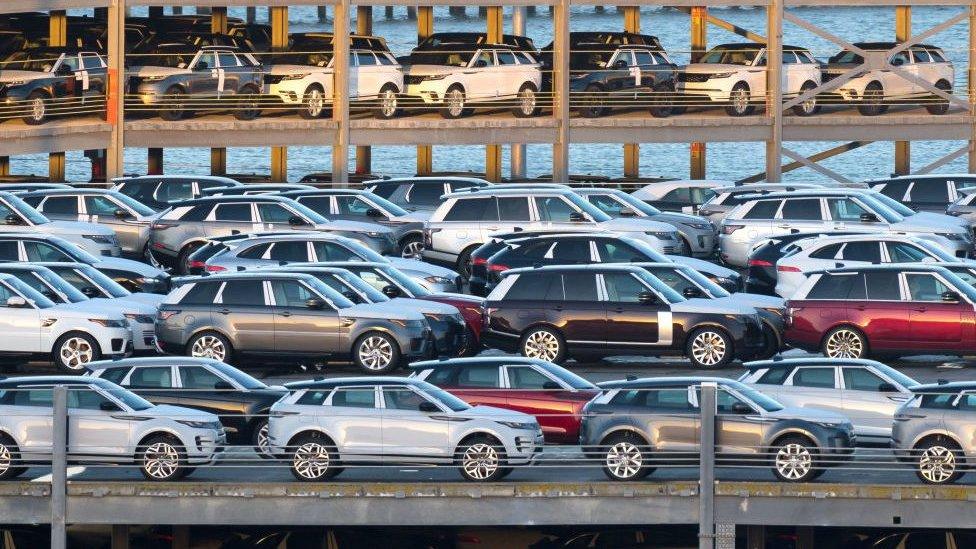Trade tensions rise as US threatens car tariffs
- Published
- comments

Trade tensions with the US have spiralled after the chancellor, Sajid Javid, took a defiant stance at Davos.
US treasury secretary Steve Mnuchin has threatened new tariffs on UK carmakers after the chancellor defied pressure to cancel a new tax on tech firms.
Mr Javid said the UK would not back down over the tax which will hit US firms like Apple, Amazon and Facebook.
A trade deal with the EU would take priority over one with the US after the UK leaves the EU this month, he added.
Both officials said Boris Johnson and Donald Trump would discuss the trade agreement and the tech tax this week during the World Economic Forum in Davos.
The UK government sees a new trade deal with the US as a high priority after Britain leaves the European Union at the end of this month.
But some parts of the UK economy are closely integrated with the EU, its largest trading partner.
The comments from Mr Javid and Mr Mnuchin came during a panel discussion at the annual gathering of business and government representatives in Switzerland.
The new tax is aimed at firms that do a lot of business in the UK but don't pay taxes based on the size of their sales.

The US is considering retaliatory tariffs on European car exports if a new tech tax is imposed
France this week agreed to suspend a similar measure after the US had threatened to impose new levies on French exports of wine, cheese and handbags.
France will not levy their tech tax until the end of the year to allow time for a multilateral coordinated agreement on tax reform to be agreed.
Mr Javid said that while the UK would like to see an international agreement, he planned to go ahead with the introduction of the new multibillion pound tax, which is due to take effect in April.
Mr Javid described the new tax as "proportionate".
Caution
US Treasury Secretary Steve Mnuchin said: "We think the digital tax is discriminatory in nature... if people want to arbitrarily put taxes on our digital companies we'll consider arbitrarily putting taxes on car companies."
Former UK chancellor, George Osborne, told the BBC that he thought the government would be wary of provoking the US over the new tax.
"It will be a very brave British government that walks into a trade war with the United States at the very moment when centrepiece of its economic policy is to strike a trade deal with the United States," he told the Today Programme.

What is the new tax?
The UK, along with several other European countries, wants to limit the tech giants' ability to avoid taxes.
They argue taxes should be based on where the digital activity takes place, not where firms have their headquarters. So if a UK consumer searches for a product or posts things online, and advertising is sold alongside those pages, the business should count - for tax purposes - as taking place in the UK.
But it has proven difficult to agree exactly how a new system would work.
So some countries including the UK, France, Italy, Austria and Turkey, have considering imposing unilateral levies.
But trade officials in Washington say US firms are being unfairly targeted.

'Hold fire'
The UK is under pressure to follow France's example and delay its plan to levy tax worth 2% of the revenues of search engines, social media companies and online marketplaces, a change which would bolster public finances by £500m a year.
The Organisation for Economic Cooperation and Development (OECD), which is overseeing efforts to find a joint solution, has urged national governments to wait for a multilateral agreement.
Secretary General Angel Gurria told the BBC that without that there would be a "cacophony and a mess" of 40 countries going their own way with "tensions rising all over the place".
Mr Gurria said that the UK government should "absolutely hold fire and contribute to a multilateral solution".
Industry body the Society of Motor Manufacturers and Traders (SMMT) called for the UK and US "to explore all options that avoid restrictive measures" in order to avoid a tit-for-tat trade war developing.
Mike Hawes, SMMT chief executive, said: "The US is one of UK automotive's most important global partners, second only to the EU in trade terms, so the continued threat of additional tariffs that could endanger the viability of our sector is of huge concern."
- Published22 January 2020
- Published21 January 2020
